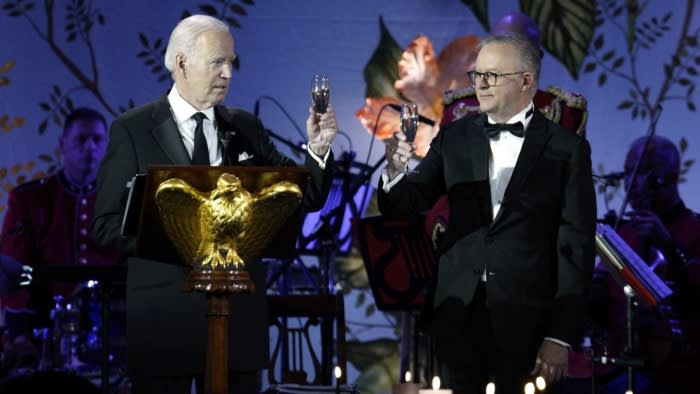Unlock the Editor’s Digest for free
Roula Khalaf, Editor of the FT, selects her favourite stories in this weekly newsletter.
The US, UK and Australia are to begin talks on bringing new members into Aukus as Washington pushes for Japan to be involved in the security pact aimed as a deterrent against China.
The Aukus defence ministers will announce on Monday that they will launch talks related to Pillar II of the alliance, which involves collaboration on technologies such as undersea capabilities and hypersonic weapons, according to people familiar with the situation. They are not considering expanding Pillar I, which focuses on Australia’s procurement of nuclear-powered submarines.
The statement will come just before US President Joe Biden hosts Japanese Prime Minister Fumio Kishida for a summit at the White House on Wednesday and a historic US-Japan-Philippines trilateral meeting on Thursday. The US and Japan will on Wednesday announce that they are planning the biggest upgrade to their security alliance since 1960.
The Aukus pledge to begin consultations on expansion is a compromise between the allies after some US officials pushed for Japan to join Aukus formally as a member.
When Aukus was launched in 2021, there was talk about others joining Pillar II at some point. As the critical ally in Asia for each member, Japan was the natural candidate for what was dubbed “Jaukus”.
As Japan increases its defence spending, for example, it is investing more in developing hypersonic weapons. Bringing in other partners would also help spread the costs of developing the technologies.
Speculation had mounted that Tokyo would be asked to work on Pillar II, particularly after US ambassador to Tokyo Rahm Emanuel this week said Japan was “about to become the first additional Pillar II partner”.
Some in the US government privately welcomed his intervention, hoping that it would add momentum to bringing Japan into Aukus. But his comments ruffled feathers from the White House to London, Canberra and Tokyo because there was no agreement.
Emanuel did not respond to a request for comment.
Australia and Britain had for months been pushing back against the idea of inviting Japan at this point, partly because they want to focus on ironing out existing complications in their trilateral co-operation.
Kurt Campbell, the US deputy secretary of state and an advocate for Japanese involvement in Aukus, this week said the US was separately doing development and co-production with both the UK and Australia but that “how we trilateralise some of that over time is challenging”.
The UK and Australia are also concerned, as are many in Washington, that Japan still lacks the security systems required to protect highly sensitive information. Campbell appeared to concede that Tokyo had more work to do, saying the US had been urging it to take measures.
“Japan has taken some of those steps, but not all of them,” Campbell said at an Aukus event at CNAS, a think-tank in Washington.
Canberra stresses the need to focus on the submarine programme before expanding Aukus by adding countries to Pillar II. “All three still agree that getting Pillar I locked in is the priority,” said one person familiar with the discussions between the Aukus allies.
The issue has sparked much debate between the allies and inside the US administration. At one point, there was an idea to have Biden, Australian prime minister Anthony Albanese and UK Prime Minister Rishi Sunak issue a joint statement to generate more impact. But they ultimately opted to have the defence ministers announce the move.
The Aukus statement will potentially pave the way for Biden and Kishida to include an aspirational reference about future Japanese involvement in the joint statement they will issue after their summit.
There has also been debate in Japan. While Tokyo has been a strong supporter of Aukus, some officials have been cautious about pushing too hard to be included given the divisions within the Aukus countries.
In an interview with the Financial Times and other media on Friday, Kishida said no formal decision had been made on how Japan would co-operate with Aukus in the future.
“To achieve a free and open Indo-Pacific, we would like to continue various efforts to strengthen our co-operation with the US, Australia and the UK, who are important partners in security and defence,” he said.
